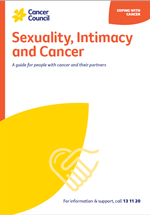- Home
- Cancer Information
- Cancer treatment
- Chemotherapy
- Managing side effects
- Sexuality and fertility
Sexuality and fertility
Chemotherapy can affect your sexuality and fertility in emotional and physical ways. These changes are common. Some changes may be only temporary while others can be permanent.
Learn more about:
Changes in sexuality
You may notice a lack of interest in sex or a loss of desire (libido), or you may feel too tired or unwell to want to be intimate. You may also feel less confident about who you are and what you can do. There may be a physical reason for not being able to have sex or interested in having sex (e.g. vaginal dryness or erection difficulties). Changes in appearance can also affect feelings of self-esteem and, in turn, sexuality.
If you have a partner, it may be helpful for them to understand the reasons why your libido has changed and to know that people can have a fulfilling sex life after cancer, but it often takes time. Some partners may feel concerned about having sex – they might fear injuring the person with cancer, feel uncomfortable with the changes in their partner or worry about being exposed to chemotherapy drugs.
Sexual intercourse may not always be possible, but closeness and sharing can still be a part of your relationship. Talk with your partner about how you’re feeling, and take time to adapt to any changes. Try to see yourself as a whole person (body, mind and personality) instead of focusing only on what has changed. If you’re worried about changes to how you feel about yourself, your relationships or sexual functioning, you may find talking to a psychologist or counsellor helpful.
For more on this, see Sexuality, intimacy and cancer, and listen to our podcast on Sex and Cancer.
Using contraception
In most cases, your doctor will advise you to use some form of barrier contraception (condom, female condom or dental dam) after each treatment session. This is to protect your partner from any chemotherapy drugs that may still be in your body fluids.
As chemotherapy drugs can harm an unborn baby, your doctor may talk to you about using contraception for some months after chemotherapy. Although chemotherapy often affects fertility, it doesn’t always. If you are in a heterosexual relationship and sexually active, you will need to use a reliable form of contraception to avoid pregnancy while having treatment. Talk to your specialist immediately if you or your partner become pregnant.
Changes in fertility
Chemotherapy can affect your ability to have children (fertility), which may be temporary or permanent. If you may want to have children in the future, talk to your doctor about how chemotherapy might affect you and what options are available. Women may be able to store eggs (ova), embryos or ovarian tissue for use at a later date, and men may be able to store sperm. This needs to be done before chemotherapy starts and requires careful consideration. In some cases, hormone injections can reduce activity in the ovaries and protect eggs from being damaged by chemotherapy.
For more on this, see Fertility and cancer.
Effects of chemotherapy on ovaries
Chemotherapy can reduce the levels of hormones produced by the ovaries. This can cause your periods to become irregular or even stop for a while, but they often return to normal within a year of finishing treatment. If your periods do not return, the ovaries may have stopped working, causing early menopause. After menopause, you can’t get pregnant naturally. Signs of menopause include hot flushes, night sweats, aching joints and dry or itchy skin. Menopause – particularly when it occurs under 40 – may, in the long term, cause bones to become weaker and break more easily. This is called osteoporosis. Talk to your doctor about ways to manage menopause symptoms.
Effects of chemotherapy on sperm
Chemotherapy drugs may lower the number of sperm produced and reduce their ability to move. This can sometimes cause infertility, which may be temporary or permanent. The ability to have and keep an erection (erectile dysfunction or impotence) may also be affected, but this is usually temporary. If impotence is ongoing, talk to your doctor.
All my life I wanted to be a father. I didn’t want cancer to ruin my chances, so I stored my sperm before treatment started. I think of this as a bit of an insurance policy.
Zac
Podcast: Sex and Cancer
Listen to more of our podcast for people affected by cancer
More resources
Prof Timothy Price, Medical Oncologist, The Queen Elizabeth Hospital, SA; Graham Borgas, Consumer: Dr Joanna Dewar, Medical Oncologist and Clinical Professor, Sir Charles Gairdner Hospital and The University of Western Australia, WA; Justin Hargreaves, Medical Oncology Nurse Practitioner, Bendigo Health Cancer Centre, VIC; Angela Kritikos, Senior Oncology Dietitian, Dietetic Department, Liverpool Hospital, NSW; Dr Kate Mahon, Director of Medical Oncology, Chris O’Brien Lifehouse, NSW; Georgie Pearson, Consumer; Chris Rivett, 13 11 20 Consultant, Cancer Council SA; Marissa Ryan, Acting Consultant Pharmacist (Cancer Services), Pharmacy Department, Princess Alexandra Hospital, QLD.
View the Cancer Council NSW editorial policy.
View all publications or call 13 11 20 for free printed copies.
Need to talk?
Support services
Coping with cancer?
Ask a health professional or someone who’s been there, or find a support group or forum
Looking for transport, accommodation or home help?
Practical advice and support during and after treatment
Cancer information
Fertility and cancer
Learn more about how cancer can affect fertility, and ways to manage this
Sexuality, intimacy and cancer
Learn how cancer and its treatment may affect your sexuality, sex life and relationships, and how to cope with this

